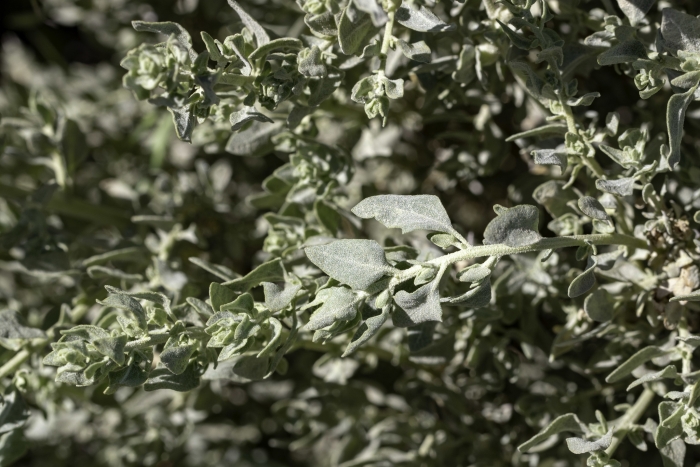Spiny Saltbush
(Atriplex spinifera)
Spiny Saltbush (Atriplex spinifera)
/
/

Zack Abbey
CC BY 4.0
Image By:
Zack Abbey
Recorded By:
Copyright:
CC BY 4.0
Copyright Notice:
Photo by: Zack Abbey | License Type: CC BY 4.0 | License URL: http://creativecommons.org/licenses/by/4.0/ | Rights Holder: Zack Abbey | Publisher: iNaturalist | Date Created: 2019-04-12T13:27:22-07:00 |
























Estimated Native Range
Summary
Atriplex spinifera, commonly known as spiny saltbush or spinescale saltbush, is a perennial shrub native to the saline and alkaline soils of arid regions in California, including the Mojave Desert, southern Transverse Ranges, and parts of the Central Valley. It is well-adapted to its native desert and salt flat habitats, where it plays a role in stabilizing soils and providing habitat for wildlife. This shrub typically grows up to 6 feet in height and is characterized by its stiff, spiny branches and a grayish or whitish appearance due to the small, oval leaves that are less than 1 inch long. The leaves are covered with tiny scales that help reflect sunlight and conserve water. Spiny saltbush is dioecious, with male and female flowers on separate plants. Male flowers are arranged in clusters, while female flowers are solitary or in small clusters, each enclosed in scaly bracts that later develop into fruit.
Spiny saltbush is valued for its ability to thrive in extremely saline soils where few other plants can survive, making it useful for habitat restoration and erosion control in suitable areas. It is also used in xeriscaping and as an ornamental in gardens that aim to conserve water. In cultivation, spiny saltbush requires minimal care, needing little water once established and tolerating poor, saline soils. It prefers full sun but can tolerate some shade. While it is generally pest-free, it can occasionally suffer from rust or fungal leaf spots in more humid climates.CC BY-SA 4.0
Spiny saltbush is valued for its ability to thrive in extremely saline soils where few other plants can survive, making it useful for habitat restoration and erosion control in suitable areas. It is also used in xeriscaping and as an ornamental in gardens that aim to conserve water. In cultivation, spiny saltbush requires minimal care, needing little water once established and tolerating poor, saline soils. It prefers full sun but can tolerate some shade. While it is generally pest-free, it can occasionally suffer from rust or fungal leaf spots in more humid climates.CC BY-SA 4.0
Plant Description
- Plant Type: Shrub
- Height: 2-4 feet
- Width: 2-4 feet
- Growth Rate: Moderate
- Flower Color: Green
- Flowering Season: Spring, Summer, Fall
- Leaf Retention: Deciduous
Growth Requirements
- Sun: Full Sun
- Water: Low
- Drainage: Medium, Fast
Common Uses
Drought Tolerant, Edible*Disclaimer: Easyscape's listed plant edibility is for informational use. Always verify the safety and proper identification of any plant before consumption., Low Maintenance, Salt Tolerant
Natural Habitat
Native to saline and alkaline soils of arid regions in California, including desert and salt flat habitats
Other Names
Common Names: Spinescale Saltbush, Spinescale
Scientific Names: , Atriplex spinifera, Obione spinifera,
GBIF Accepted Name: